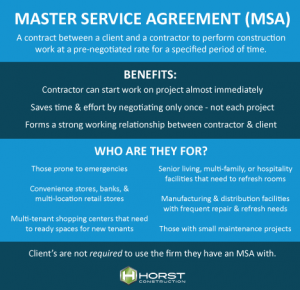

by Ryan Null, Director of 3R Team®
Imagine you’re the manager of a convenience store and you get a call in the middle of the night informing you that a car just drove through your front entrance.
Now that you’ve been jolted from your sleep, it’s time to get someone to repair the damage, order a custom-fitted door, and help get your store back to normal operations ASAP. But with the traditional approach to a construction process, the bid process and time-consuming negotiations could mean your store would go days or even weeks before the repair work begins.
What if you could get your business back up and running more quickly by eliminating the time-consuming process of procuring a contractor, and instead count on one company to do all your major repairs and facility updates? The good news is you can. That one company is Horst Construction, and an MSA is the way to get it done.

What is a Master Service Agreement?
A Master Service Agreement, or MSA, is a contract that a contractor executes with a client to perform construction work at pre-negotiated rates and terms over the course of a specified time period (usually a year). When any work is required, the contractor will go onsite and put an amendment to the MSA in place to cover that specific project.
There is no waiting for contractors’ insurance or unnecessary delays when ordering materials. With an MSA, the contractor can react to a customer’s needs very quickly, order replacement parts without delay, and begin performing the work.
While the customer is not required to use the MSA firm exclusively, they understand the MSA firm’s rates and fees in advance, and most importantly—the work can be completed quickly and efficiently.
What Types of Businesses Should Have an MSA for Construction?
MSAs allow contractors to quickly get to work on a project. MSAs can cover a wide variety of potential projects, making them ideal for several types of businesses. These can include:
- Those who are prone to emergencies.
- Convenience stores, banks, and other multi-location retail stores.
- Malls or other multi-tenant shopping centers that need to ready a space for a new tenant quickly.
- Hospitality, senior living, or multi-family housing facilities that require turnover updates, minor repairs, or room by room modernization.
- Distribution centers that incur frequent repair and refresh needs.
- Clients that have completed a large capital project with Horst, but also need them available for smaller maintenance projects, accounted for out of a separate facility-specific budget.
What Type of Information is Typically Covered in a Master Service Agreement?
An MSA will lay out all the information needed for an effective working relationship between the two parties. While what is included may depend on the type of work the client requires, here are a few sections commonly included in MSAs:
- The Term – The term of the master service agreement is how long the agreement will last. This will vary and can span one year or several years. The client and their contractor will discuss what duration makes the most sense given the nature of work.
- Compensation – Defining work rates and fees in the MSA is what allows the contractor to respond quickly and efficiently to the client’s construction needs. Negotiating while drafting the MSA means it won’t hold up a construction project or repair. Pricing will be clearly laid out and transparent. Invoicing and payment procedures are also often covered.
- Performance of Work and Safety Requirements – This section often stipulates the expectations the client has for the contractor as they work on site. It will outline the materials, supplies, and personnel they are expected to supply, as well as how the construction crew should conduct themselves, and any rules they should adhere to, such as a smoke-free site.
- Insurance – Making sure a contractor meets the insurance requirements during the MSA drafting is another time-saver that will get an MSA firm working on a project more quickly.
- Warranties – This section should make clear what type of warranties are included with the work.
- Confidentiality – The client will stipulate any confidentiality requirements the contractor should follow.
- Termination – This will outline the procedure either party needs to follow if the contract must be terminated before the end of the term.
What Does the MSA Process Look Like?
The MSA process is typically a straightforward and simple one. Once the client finds the right firm to enter into an MSA with, they will draft and sign the contract. Then, depending on the nature of the work required, the contractor will start the renovations, or they will wait it out until the client needs their services. Then, as soon as their services are necessary, the contractor will put an amendment to the MSA in place to cover that specific project and they can get to work.
Horst has entered into several MSAs over the years, forming long-lasting relationships with clients built on trust, experience, and always doing the right thing. Partner with a contractor you can trust. For more information on MSAs or other work with Horst Construction, contact Ryan Null.
This post was originally posted on October 29, 2017. It was revised and reposted on June 1, 2020.
Oops! We could not locate your form.



